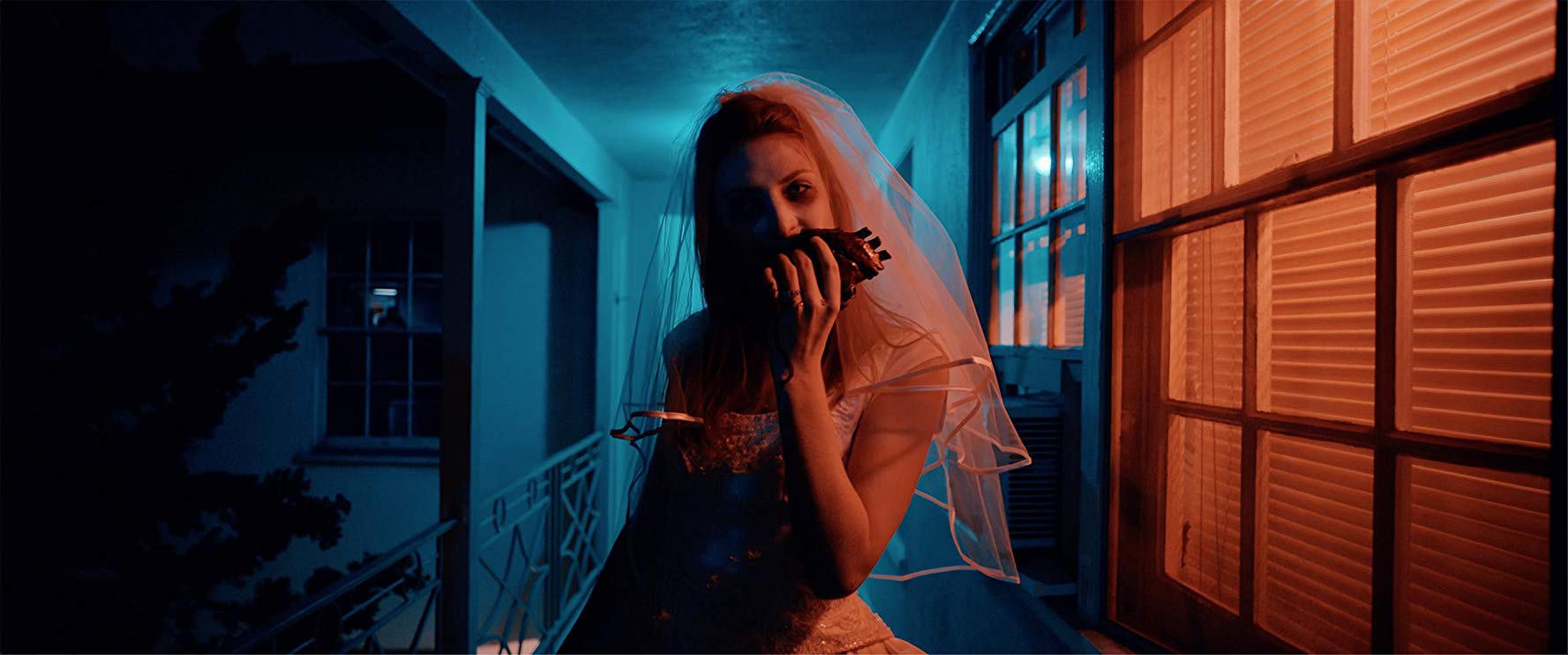
Just by reading the title of Philophobia: or the Fear of Falling in Love, you have a pretty good idea of what it’s about. Directed by Tyler Cole, it stars Aaron Burt (who also wrote the script) as Damien, a commitment-phobe who freaks out when his girlfriend of seven months, Danielle (Emily Pearce), invites him to meet her mother. Unwilling to admit how upset he is over the resulting break-up, Damien begins seeing visions of not just Danielle, but their possible married life together and struggles to keep his cool as he shows his best high school friend, Alan (David Lenten), around Los Angeles for the weekend.
The first thing that strikes you about Philophobia is the cinematography. The first scene is an unbroken tracking shot that follows Danielle and a friend out of a bar and onto the street, where Damien will eventually run up to return the purse Danielle forgot only to get hit when she mistakes him for an attacker. It’s an ambitious start and the foreboding shadows and low, often blue or orange lighting sets a striking tone for the rest of the film. In that scene and throughout, Philophobia is a strange mix of comedy and horror that’s, unfortunately, only intermittently effective.
Let’s start with the comedy. Unable to sleep because Danielle’s specter is haunting him, Damien goes to a local bar where he gets hit on and then takes home two women. One, Becca (Christina Robinson), is sexy and cool, clearly into Damien and perhaps just what he needs to move on from the break-up. The other, Nancy (Carly Reeves), is obnoxious and domineering, a parody of the worst the dating scene has to offer meant to remind Damien what he’s losing by leaving Danielle. On one hand, watching the obvious way the girls first grab Damien’s attention in the bar or initiate a threesome with little regard for whether he’s turned on by their kissing is a hilariously absurd way of emphasizing how upset he is. On the other, the lowkey sexism of those scenes is hard to ignore. The audience can plainly see that Danielle is great and Damien is a fool to lose her even without depicting every other woman he meets as even more nightmarish threats to his happiness and the choice feels both lazy and beside the point.
More effective is the horror, which escalates as the film goes on. At first, the manifestation of Damien’s commitment-phobia is subtle and creepy: a shadow ducking into a doorway here or a vision of a ghoulish version of Danielle there. However, the harder Damien works to deny his love for Danielle, the more extreme his visions become. While shots of a ghoul telling Damien she’s late or a nightmare version of Danielle in a wedding dress play to the theme, recurring scenes of a rude bartender or the image of a mean birthday clown from Damien’s childhood do more to distract than scare. Worse, as the film goes on, both the ghoul make-up and the nature of the weirdness Damien experiences become too similar, making each scare feel less effective than it should.
Still, while some of the horror and comedy doesn’t quite work, Burt’s solid performance mostly holds the film together—particularly in the character’s more emotional moments. Perhaps his best moment comes near the film’s climax, when Damien scrolls through his high school girlfriend’s Facebook to look at her engagement photos. As Damien begins to sob, Burt makes him seem inconsolable, snot running from his nose as he tries to wipe away the flood of tears. It’s an impressive bit of performance and exactly the kind of realization the audience needs to see from Damien in that moment. It’s also too little too late.
Damien is, from the moment we meet him, hard to love. When Danielle first drops the L-word, the way he reacts to her vulnerability by first ignoring it and then downplaying it seems not just selfish, but cruel. Later, he seems like even more of a sociopath while recording a podcast episode with Alan, not only repeatedly pushing his friend to talk about his relationship, but deliberately recording him without his knowledge because that’s what he thinks keeping things “real” means. Though Burt plays those moments very well, they also make it hard to like Damien—let alone root for him. And while liking a lead character isn’t a requirement for enjoying a film, for viewers who don’t share Damien’s fears, his behavior can make it not just hard to find his visions of domestic life scary, but to not dismiss him as a man-child who needs to grow up already.
As executed, Philophobia: or the Fear of Falling in Love is an often-enjoyable horror-comedy about one man’s terror of commitment. It’s beautifully shot, well-edited and includes some strong performances. However, for viewers that don’t find what Damien fears scary too, it all seems–if not ridiculous–then childish and, ultimately, hard to understand. Because in the end, it’s not really falling in love that Damien fears. Maybe it’s not even commitment. It’s gerasophobia, the fear of growing up.
Philophobia: or the Fear of Falling in Love is now available on VOD and Blu-ray.
https://www.youtube.com/watch?v=z9Gdfu8wO4U&t

